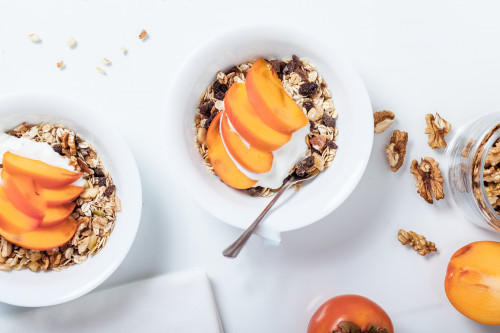It’s not uncommon for cancer treatment to affect your energy and decrease your appetite due to some of the common side effects such as nausea, vomiting, taste changes, and mouth sores. Other times you become too fatigued to cook, let alone go to the grocery store. If your pantry and fridge aren’t adequately stocked full of nutrient dense foods that are convenient, then you may not meet your nutrition goals. Certain types of cancers or many advanced cancers can also increase your calorie needs, so even if you are eating well, you still may need to adjust your diet by adding in some of these calorie rich foods.
Some of my patients start to lose some weight and don’t seem too concerned (and many even like the ease of the weight loss). But too much weight loss can affect your bodies ability to heal adequately, can affect recovery, your energy levels, and even in some causes it can cause treatment delays if the loss is too severe. Others can also have an increase in severity of side effects from treatment without adequate nutrition.
Certainly there is not a one size fits all approach for eating during cancer treatment as cancer types can so widely vary, and everyone has different factors to take into account. It’s important you clarify with your doctor and medical care team the approach that’s right for you. If you’ve had significant weight loss (often defined as greater than 10% weight loss in 6 months or greater than 5% in 3 months) or are eating significantly less for more than a few days, it’s worth addressing this with your doctor or registered dietitian. If you are not able to eat much, then here are some strategies for getting started that can help maximize the calories you eat when you are able to consume some food.
Tips for maximizing calories
- When you are hungry maximize that time and eat then.
- Eating smaller frequent meals might be best since they can be less overwhelming.
- Drink fluids outside of meal times to prevent feeling fuller.
- Fat provides a lot of calories in just a few bites as fat has more calories per gram than protein and carbs.
- Add extra condiments when you can to your food. For example, ketchup, bacon bits, salad dressings, etc.
- Add gravies, spreads, and sauces to food you are eating. For example, peanut butter on toast instead of jelly.
- Boost calories with additives like croutons, granola, dried fruits, cream based salad dressings, butter, and oils.
- Consider adding smoothies or nutrition supplements like (Boost, Ensure, Orgain, Muscle Milk, Carnation Instant Breakfast, Glucerna, etc.) Sometimes it’s easier to drink than it is to eat.
- Add cheese or cheese sauce to veggies.
- Try milk and juice based smoothies, in place of drinking tea, black coffee, or diet drinks.
- Buy canned tuna in oil instead of soaked in water.
- Create a pleasant atmosphere by playing music, opening a window, or eating with someone.
- Try to make food more appealing with colors or textures.
- Consider going for a walk as exercise can stimulate your appetite.

By Alexander Mils on Unsplash
Foods to have handy in your pantry
- Nuts, seeds, and nut butters (i.e. peanut butter, almond butter, or cashew butter).
- Greek yogurt
- Cheese (can make grilled cheese, quesadillas, or add to crackers and fruit/veggies).
- Snack on string cheese
- Cottage cheese
- Canned tuna (soaked in oil)
- Whole milk, heavy cream, whipping cream)
- Dried fruit
- Avocados
- Condiments of choice
- Gravies and sauces (i.e. Alfredo sauce, vodka sauce, hollandaise sauce, bechamel sauce)
- Custards and puddings
- Granola bars
- Sour cream
- Beans
- Hummus
- Ice cream
- Eggs
- Meat loaf
- Mashed potatoes
- French Toast
- Pancakes
- Quiche
- Cream based soups
- Croutons
- Granola
- Olives
- Oils and butter
- Protein powder (optional, but can add to gravies, sauces, and smoothies)
Give some of these foods a try and see how it goes. The foods that you are able to tolerate and can get down may vary at different points in your treatment or can even change if your treatment regimen is adjusted. You may need to shift your nutrition plan, and the foods that you eat, based off of how you are feeling and what your body will allow for. Sometimes people feel guilty for eating certain foods that they wouldn’t normally eat a lot of, but that’s okay. To prevent treatment delays or to help reduce side effects, you may need to eat whatever your body allows you to do. Talk with your doctor to see if they agree with this plan as not every plan or recommendation is good for everyone. For example, I had a patient that could not tolerate most food, but could mostly only tolerate ice cream and she felt guilty about it. Normally consuming regular ice cream all day, everyday, would not be recommended for most people. But this particular patient was becoming malnourished and needed any calories she could get. However, if she was diabetic and on steroids (which are known to increase blood sugar), it may have not been the best choice for her either. It’s possible that this person would be better suited for sugar free ice cream and/or to have their doctor adjust their diabetic medications as well.
So make sure you tell your medical care team about what issues you are having with your nutrition and come up with a plan that’s tailored specifically for you. Also, ask for an oncology dietitian consult from the ordering provider if you don’t already see one—they can help tremendously and can communicate with your team on your behalf.
This post originally appeared on Survivors’ Table. It is republished with permission.








Comments
Comments